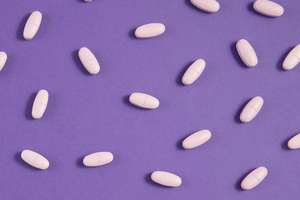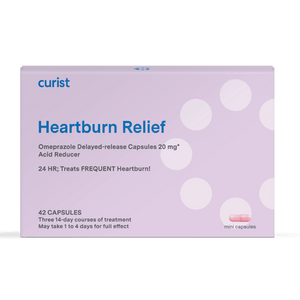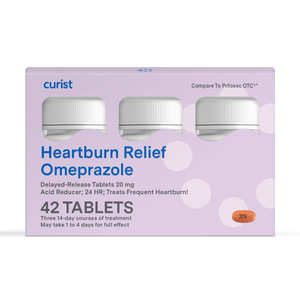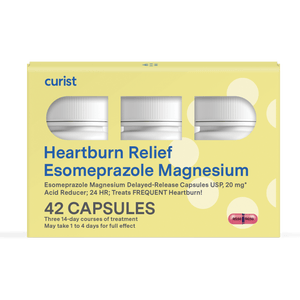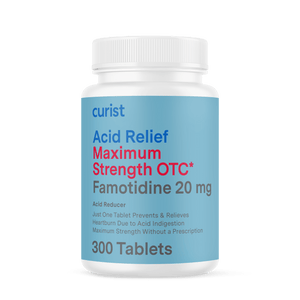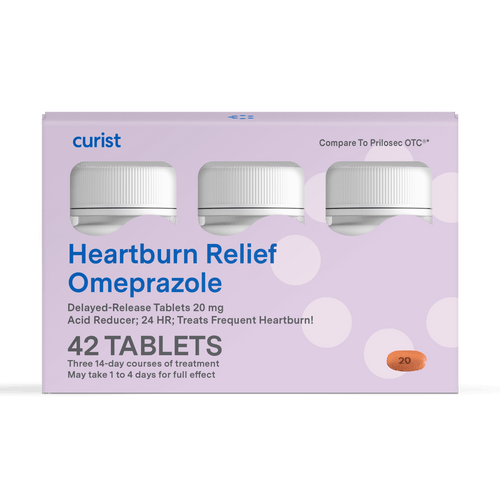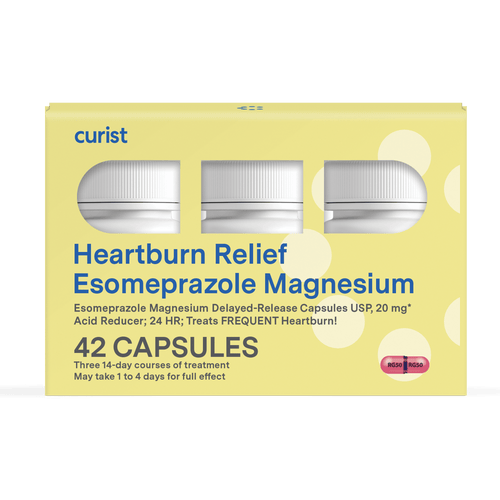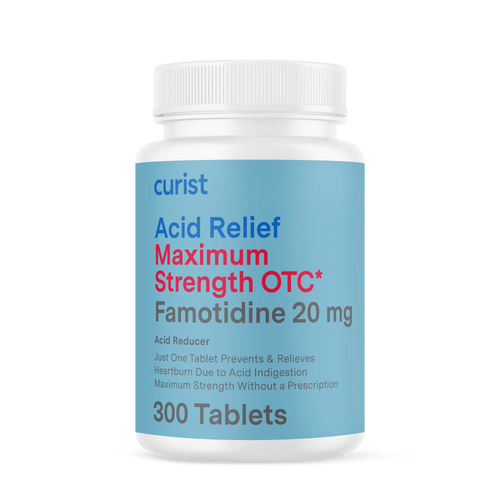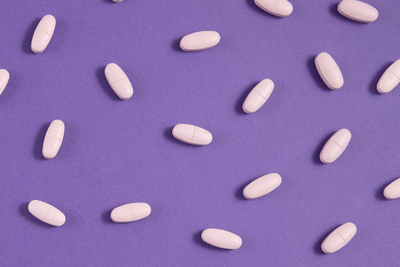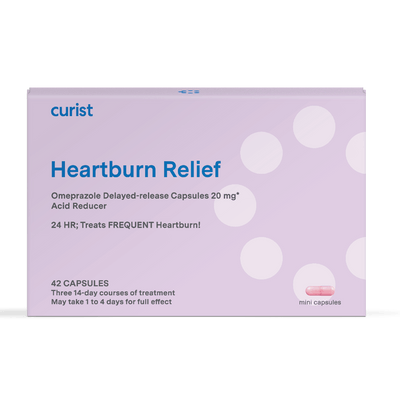By Deni Hui, The University of Texas at Austin College of Pharmacy
Curist delivers over-the-counter medicines to your door at a fraction of the price of traditional brands. We hope everyone stays safe and healthy during this time.
If you are experiencing occasional or frequent heartburn, the fiery feeling is the last way you want to remember a great meal. It is important to know that you do not have to give up all of your favorite foods to better manage your heartburn. The key is to identify what triggers your heartburn and what lifestyle or diet adjustments you can make to help reduce and avoid them. Continue reading to learn more!
Worst Food Triggers of Heartburn
Unfortunately, a lot of food can trigger heartburn symptoms. Not every person will react to every food, so it’s important to pay attention to your symptoms after meals to help identify what causes your heartburn. Here’s a list of the most common food triggers of heartburn:
#1 Worst Food For Heartburn: Alcohol
Not only does alcohol stimulate the stomach to produce more acid, it also relaxes the muscles around the stomach, making it easier for acid to back up into the esophagus.
#2 Worst Food For Heartburn: Caffeine
When your caffeine intake is too high, it can relax the muscle that connects the stomach to the esophagus and cause acid reflux.
#3 Worst Food For Heartburn: Chocolate
Chocolate can relax your lower esophageal sphincter and cause stomach acid to escape into the esophagus.
#4 Worst Food For Heartburn: Citrus fruits or juices
Citrus, like oranges and grapefruits, is highly acidic and may exacerbate acid reflux symptoms. Unfortunately it does not matter if the fruit is whole, or as a juice.
#5 Worst Food For Heartburn: Fried and fatty foods
Typically, fried and fatty foods linger longer in the stomach and slow down digestion. That can increase stomach pressure and force stomach acid to back up into the esophagus.
#6 Worst Food For Heartburn: Raw onions or garlic
Raw onions and garlic are especially acidic and can stimulate stomach acid production. Cooking onions and garlic completely before consumption may ease your heartburn symptoms.
#7 Worst Food For Heartburn: Soda or carbonated beverages
The gas that is released from soda and carbonated beverages can increase stomach pressure and force stomach acid to back up into the esophagus, which can create heartburn.
#8 Worst Food For Heartburn: Spicy foods (eg. chili peppers, black pepper)
Spicy foods contain a compound called capsaicin which is known to slow down the rate of digestion and increase the risk that food in the stomach will reflux upwards and cause heartburn symptoms.
#9 Worst Food For Heartburn: Tomatoes and tomato sauces
Some people create too much stomach acid when they eat tomato-based foods. This overflow of acid can back up into the esophagus and cause a burning sensation in the chest.
#10 Worst Food For Heartburn: Vinegar
For some people, apple cider vinegar can increase the acidity content of the stomach and cause more irritation or burning sensation. Others, however, may find apple cider vinegar useful in digestion as it contains probiotics. So this one depends on you.
#11 Worst Food For Heartburn: Mint
Peppermint can relax the muscle that connects the stomach to the esophagus and cause acid reflux.
With this list of heartburn trigger foods in mind, keeping track of what might be causing your heartburn can also be useful as you can either avoid those foods or make simple substitutes.
Best Foods To Help Reduce Heartburn
While there is no specific diet that is recommended for preventing heartburn, research has shown that a high-fiber, low-fat diet emphasized on lean meats, fruits and vegetables, and whole grains could help reduce your heartburn symptoms. Here’s a list of foods that may help manage your heartburn symptoms:
- Healthy fats (eg. avocados, olive oil, nuts)
- Herbal remedies. Consider adding a bit of ginger, licorice, or chamomile into your smoothies or try drinking them in non-caffeinated teas can help protect your esophagus lining and reduce your heartburn symptoms.
- Lean meats
- Oatmeal
- Bananas are shown to naturally fight acid. Consider topping your oatmeal with sliced bananas can help reduce heartburn symptoms.
- Vegetables or non-citrus fruits
- Water. Choosing water instead of carbonated beverages can help counteract acidic foods and reduce heartburn symptoms.
Best 5 Tips to Eating Well With Heartburn
Besides identifying what foods causes heartburn for you, there are several great tips for reducing heartburn symptoms besides just avoiding trigger foods:
Tip 1 To Reduce Heartburn: Chew gum
When you chew gum, your mouth creates saliva which acts as a natural barrier to acid. It may help ease the burning feeling you may experience when you get heartburn.
Tip 2 To Reduce Heartburn: Drink Water
Drinking a small glass of lukewarm water after meals can help dilute and flush out stomach acid. Replacing heartburn unfriendly drinks, like soda or caffeinated coffee, with water may also help reduce reflux.
Tip 3 To Reduce Heartburn: Eat slow and chew
As food takes time to digest, slowing down how quickly you eat can make you feel full and decrease the likelihood of heartburn
Tip 4 To Reduce Heartburn: Eat small and regular portions
Eating large portions can lead to an overly full stomach. This can put additional pressure on the lower esophageal sphincter (LES) and increase chances of acid reflux. Practicing portion control can help you avoid the discomfort.
Tip 5 To Reduce Heartburn: Substitute foods that trigger heartburn
Small changes can make a big difference. So consider:
- Replace caffeinated sodas or citrus juices with water or tea.
- Replace chocolate with fruit-flavored candy or gum
- Bake, broil, or grill instead of frying
- Substitute salad for fries
- Swap tomato-based sauces for broth-based sauces
Recommended Heartburn-Friendly Foods & Diet
We understand that the meal-planning suggestions above can be overwhelming and hard to visualize. Here is a sample day that puts together most of the heartburn relief suggestions so you may see how it can all fit together for you!
Heartburn-Friendly Breakfast
- High-fiber hot or cold cereal with nonfat or 1% low fat milk
- Low-fat turkey bacon
- Apple Juice
- Low-fat yogurt
- Fresh fruits (non citrus)
- Decaf green tea or water
Heartburn-Friendly Lunch
- Roasted turkey & avocado sandwich on whole wheat bread
- Baby carrots or other raw vegetables
- Drink a glass of water after meal
- Chew non-peppermint gum after meal
Heartburn-Friendly Afternoon Snack
- Whole-grain crackers
- Reduced-fat cheese
- Apple slices
- Decaf green tea
Heartburn-Friendly Dinner
- Moderate-sized portions of high fiber pasta with less-fat sauce with some meat or fish if desired (eg. cooked shrimp or lean beef)
- Steamed vegetables
- A light dessert (eg. frozen fruit bar)
- Drink a glass of water after meal
- Chew non-peppermint gum after meal
Treating Heartburn With Medicine
If diet changes do not completely reduce or fix your heartburn issues, consider turning to heartburn medicine. Frequent heartburn can be treated with over-the-counter medicines like omeprazole and esomeprazole (available at Curist here). Your heartburn friendly diet may be working but if you’re still experiencing heartburn two or more days a week - a PPI medicine (like omeprazole or esomeprazole) can help treat your frequent heartburn symptoms. With only one pill a day, you can have 24 hours of heartburn relief and experience no heartburn. It is to be taken for 14 days but no more than every 4 months on an as needed basis.
To learn more about these medicines, and heartburn in general, please check out Curist’s other articles:

